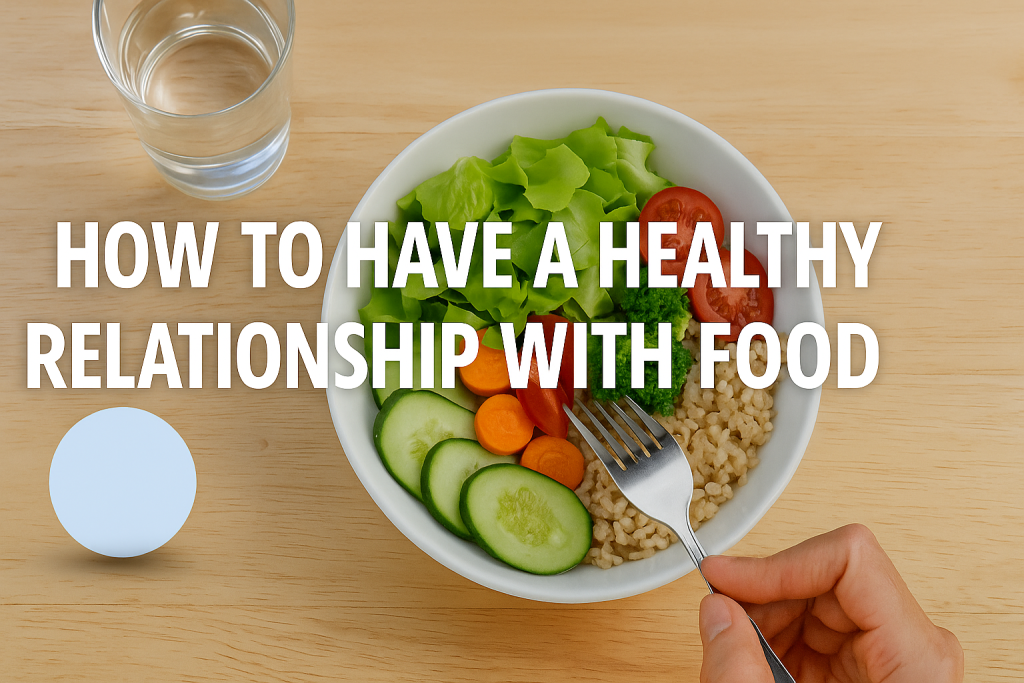In a world where diet culture and food trends dominate our daily conversations, it’s easy to forget the importance of fostering a healthy relationship with food. If your thoughts about eating are filled with guilt, anxiety, or confusion, you are not alone. Many people struggle to find balance between enjoying food, nourishing their bodies, and meeting their health goals.
Building a positive, mindful, and healthy relationship with food is possible for everyone. This guide will walk you through practical strategies, expert insights, and actionable steps to help you eat with confidence, joy, and true nourishment.
What Does a Healthy Relationship with Food Look Like?
A healthy relationship with food is about more than nutrient counts or body weight. At its core, it means:
- Listening to your body’s hunger and fullness cues
- Eating without guilt or shame
- Honoring cravings without losing control
- Valuing food for both nourishment and pleasure
- Letting go of strict food rules
- Approaching eating as a form of self-care, not punishment
When you have a healthy relationship with food, you are free from obsession and anxiety. Food becomes a source of energy, pleasure, and connection, not distress.
Why Is It Important to Have a Healthy Relationship with Food?
An unhealthy relationship with food can affect your physical health, mental well-being, and quality of life. Chronic dieting, food restriction, and guilt can lead to negative outcomes like:
- Disordered eating patterns such as bingeing, purging, or excessive restriction
- Anxiety and stress around meals
- Poor body image and low self-esteem
- Nutrient deficiencies from imbalanced eating
- Social withdrawal due to fear of eating around others
On the other hand, cultivating a healthy approach to eating supports better nutrition, balanced energy, improved mood, and a life that is more joyful and fulfilling.
Signs Your Relationship with Food May Need Healing
If you relate to any of the following, it might be time to reassess how you think and feel about food:
- Feeling guilty or anxious after eating certain foods
- Labeling foods as “good” or “bad”
- Constantly thinking about what or when you’ll eat next
- Eating in secret or hiding food
- Ignoring hunger cues or eating past fullness regularly
- Letting the scale or diet rules dictate your eating habits
How to Build a Healthy Relationship with Food
Changing your relationship with food is a journey, not a quick fix. Here are proven strategies to help you get started:
1. Practice Mindful Eating
Mindful eating means paying attention to the present moment during meals. Instead of eating distractedly, focus on:
- The flavors, textures, and aromas of your food
- How hungry or full you feel
- Your emotions and thoughts about eating
To get started, try eating one meal a day without screens or multitasking. Savor every bite and check in with how your body feels throughout the meal.
2. Ditch the Diet Mentality
Restrictive diets often backfire and make you crave forbidden foods even more. Instead of following rigid rules, practice intuitive eating — an approach that emphasizes:
- Eating when you’re hungry, stopping when you’re satisfied
- Choosing foods that you enjoy and that nourish your body
- Trusting your body’s wisdom over external diets or trends
Let go of labels like “cheat day” or “clean eating.” All foods can fit into a healthy lifestyle.
3. Reframe Negative Self-Talk
Notice how you talk to yourself about food and your body. If you catch yourself saying things like “I was bad for eating cake” or “I have no willpower,” challenge these thoughts. Replace them with kinder, more compassionate statements:
- “Food is not a moral issue.”
- “I am allowed to enjoy treats without guilt.”
- “My worth is not determined by what I eat.”
4. Learn to Honor Your Hunger and Fullness
The body is incredibly wise. Tune in to subtle signals of hunger, like stomach growling, low energy, or irritability. Similarly, practice recognizing signs of fullness, such as satisfaction, comfort, and loss of interest in food.
Try using a hunger/fullness scale (from 1, ravenous, to 10, painfully full) to help you gauge your needs without judgment.
5. Give Yourself Permission to Enjoy All Foods
When we restrict certain foods, they often gain power and become even more tempting. Allowing yourself to enjoy a variety of foods — including dessert — reduces the urge to binge or overeat “forbidden” treats.
Remember: no single food will make or break your health. It’s your overall pattern of eating that matters most.
6. Focus on Gentle Nutrition
Gentle nutrition means making food choices that honor your health and taste buds, without rigid rules. Ask yourself:
- How can I add more color, flavor, and nutrients to my meals?
- Which foods make me feel energized and satisfied?
- How can I enjoy eating while meeting my body’s needs?
Nutrition is about balance and flexibility, not perfection.
7. Seek Professional Support If Needed
Sometimes, an unhealthy relationship with food may signal deeper issues, such as an eating disorder or chronic stress. If you feel overwhelmed, reach out to a registered dietitian, therapist, or support group specializing in eating behaviors. Professional support can provide personalized strategies and emotional healing.
Tips for Sustaining a Positive Relationship with Food
- Eat regularly throughout the day to avoid extreme hunger
- Keep a variety of nourishing foods on hand
- Share meals with loved ones for added enjoyment and connection
- Be kind to yourself if you overeat or make choices you regret; tomorrow is a new day
- Celebrate progress rather than perfection
Conclusion: Embrace Food as a Source of Nourishment and Joy
Learning how to have a healthy relationship with food is a lifelong process. It’s about trust, kindness, and curiosity rather than judgment or control. By practicing mindful eating, letting go of strict rules, and treating yourself with compassion, you can transform your approach to food and create lasting well-being.
Remember, everyone’s journey is unique. Start where you are, try new strategies, and honor the progress you make along the way. Your relationship with food can be both nourishing and joyful.


